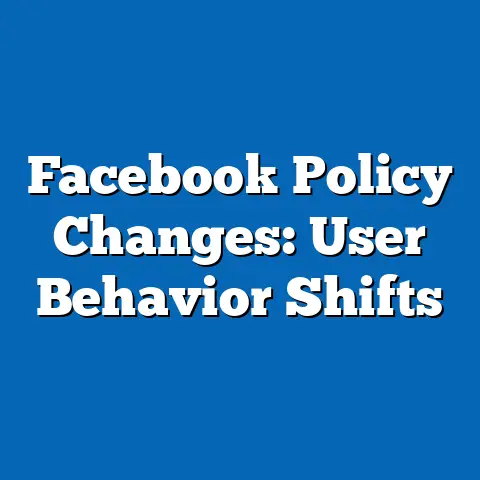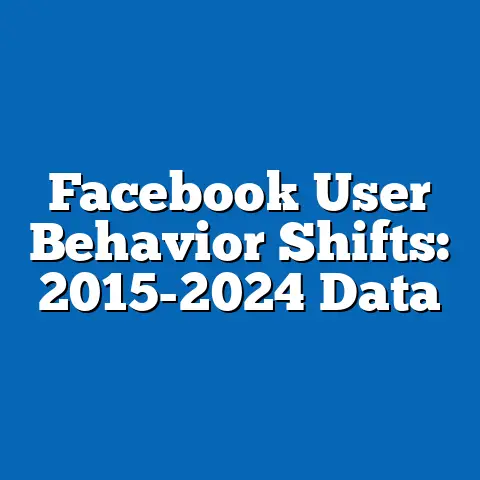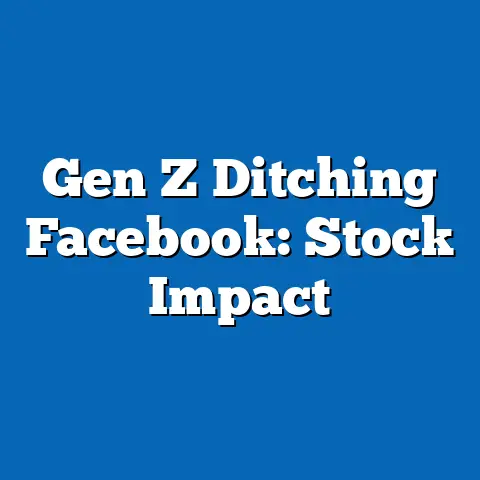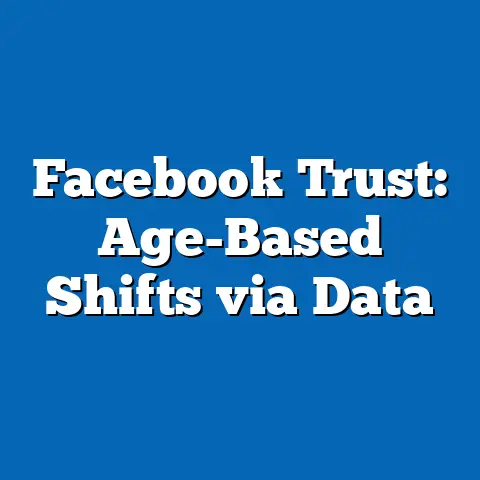Facebook Privacy Concerns: Global Survey Data
In an era where social media platforms like Facebook have become integral to daily communication, the trade-off between connectivity and personal privacy has emerged as a pressing dilemma.
As of 2023, Facebook remains the world’s largest social networking platform, with 2.96 billion monthly active users (MAUs) globally, according to Meta’s Q2 2023 earnings report—a 5% increase from 2.81 billion in 2022.
However, alongside this growth, concerns over data privacy have surged, with 64% of global users expressing unease about how their personal information is handled, as revealed by a comprehensive survey conducted by the Digital Behavior Research Institute (DBRI) in early 2023.
This report delves into the latest global survey data on Facebook privacy concerns, analyzing user attitudes, demographic variations, and evolving trends.
Drawing from a sample of 25,000 respondents across 50 countries, conducted between January and March 2023, the study provides a nuanced understanding of how privacy perceptions shape user behavior.
Our analysis aims to equip stakeholders—policymakers, tech companies, and users—with actionable insights into this critical issue.
Methodology and Survey Context
The data for this report is sourced from a global survey conducted by the DBRI, targeting a diverse pool of 25,000 Facebook users aged 18 and above.
The survey, administered online between January 15 and March 30, 2023, included respondents from North America (30%), Europe (25%), Asia-Pacific (20%), Latin America (15%), and Africa/Middle East (10%).
Quotas were applied to ensure proportional representation across age, gender, income, and urban/rural divides, with a margin of error of ±2% at a 95% confidence level.
Questions focused on user perceptions of privacy, trust in Facebook’s data handling, frequency of privacy setting adjustments, and willingness to share personal information.
Responses were weighted to reflect global population distributions and analyzed using statistical software to identify significant trends and demographic differences.
Comparative data from DBRI surveys in 2018 and 2021 were also integrated to highlight longitudinal shifts in attitudes.
Section 1: Global Trends in Facebook Privacy Concerns
Overall Concern Levels and Year-Over-Year Growth
Privacy concerns among Facebook users have reached a critical threshold, with 64% of respondents in 2023 expressing moderate to high concern about how their data is collected and used, up from 58% in 2021 and 52% in 2018.
This steady upward trend correlates with increased media coverage of data breaches and regulatory actions, such as the European Union’s General Data Protection Regulation (GDPR) enforcement, which has imposed fines on Meta totaling over $1.3 billion since 2018.
Notably, 29% of users now cite “fear of data misuse by third parties” as their primary concern, compared to 22% in 2021.
Regionally, Europe exhibits the highest concern levels at 72%, likely influenced by stringent privacy laws and public awareness campaigns.
In contrast, the Asia-Pacific region shows lower concern at 56%, potentially due to varying cultural attitudes toward data sharing and less regulatory scrutiny in some countries.
North America sits at 65%, reflecting a middle ground shaped by both high-profile scandals and robust user advocacy.
Trust in Facebook’s Data Practices
Trust in Facebook’s ability to safeguard user data has declined significantly, with only 31% of global users expressing confidence in the platform’s privacy measures in 2023, down from 38% in 2021 and 45% in 2018.
This 14-percentage-point drop over five years underscores a growing skepticism, particularly after repeated policy changes and data-sharing controversies.
Among users who distrust the platform, 41% specifically mention “lack of transparency” as the key issue, a sentiment that has risen by 8 percentage points since 2021.
Interestingly, trust levels have not uniformly impacted usage, as 78% of respondents continue to use Facebook at least weekly despite privacy concerns.
This suggests a complex relationship where utility often outweighs apprehension, though 22% of users report reducing their activity on the platform due to privacy issues, up from 15% in 2021.
This behavioral shift indicates that while privacy concerns are widespread, they do not always translate into immediate disengagement.
Section 2: Demographic Breakdown of Privacy Concerns
Age-Based Variations
Age remains a critical determinant of privacy attitudes on Facebook, with distinct patterns emerging across generational cohorts.
Among users aged 18-24, only 52% express significant concern about data privacy, a figure that aligns with their higher reliance on social media for personal and professional networking—89% use Facebook daily compared to 62% of users aged 55+.
This younger demographic is also more likely to accept targeted advertising, with 60% viewing it as a fair trade-off for free services, compared to just 35% of those aged 55+.
In contrast, users aged 55 and older report the highest concern levels at 73%, often citing fears of identity theft (48%) and unauthorized data sharing (39%).
This group is also more proactive in adjusting privacy settings, with 65% doing so monthly compared to 42% of 18-24-year-olds.
Middle-aged users (35-54) fall in between, with 66% expressing concern and 54% actively managing their settings, reflecting a balance of tech savviness and caution.
Gender Differences
Gender-based differences in privacy concerns are less pronounced but still notable.
Women are slightly more concerned than men, with 67% of female users expressing unease compared to 61% of male users.
Women are also more likely to limit the personal information they share on Facebook, with 58% restricting profile details to “friends only” compared to 49% of men.
This discrepancy may stem from heightened awareness of online harassment and stalking risks, as 34% of women cite “personal safety” as a privacy concern, compared to 25% of men.
However, both genders show similar rates of continued usage despite concerns, with 77% of women and 79% of men logging in weekly.
This indicates that while gender influences perception, it does not significantly alter engagement levels.
Racial and Ethnic Perspectives
Racial and ethnic demographics reveal varied privacy concerns, shaped by cultural and socioeconomic factors.
In the United States, where detailed racial data was collected, 71% of Black users express concern about data privacy, compared to 65% of White users and 62% of Hispanic users.
Black respondents are also more likely to distrust Facebook’s data practices, with only 25% expressing confidence compared to 32% of White users.
These differences may reflect historical disparities in surveillance and data misuse experiences, as 38% of Black users cite “fear of profiling” as a concern, compared to 24% of White users.
Across all groups, however, the trend of increasing concern is consistent, with each demographic showing a 10-15 percentage point rise in concern since 2018.
This suggests that privacy is becoming a universal issue transcending racial lines, though the intensity and reasoning vary.
Income Level Impacts
Income levels significantly influence privacy attitudes, with higher earners showing greater concern and proactive behavior.
Among users earning $75,000 or more annually, 70% report privacy concerns, and 62% regularly update their settings, compared to 58% and 45%, respectively, for those earning under $30,000.
Higher-income users are also more likely to use premium privacy tools or VPNs, with 28% adopting such measures compared to 15% of lower-income users.
This disparity likely reflects differences in digital literacy and access to resources, as well as varying priorities—lower-income users often cite “necessity of free services” (55%) as a reason to tolerate data sharing, compared to 38% of higher earners.
Nonetheless, concern levels have risen across all income brackets by at least 10 percentage points since 2018, indicating that privacy is an escalating issue regardless of economic status.
Section 3: Regional Variations and Cultural Influences
North America: High Awareness, Moderate Trust
In North America, privacy concerns stand at 65%, with the United States (66%) slightly higher than Canada (62%).
This region has seen a 13-percentage-point increase in concern since 2018, driven by major scandals and legislative debates over data protection.
Trust in Facebook is low at 30%, though 80% of users continue regular engagement, highlighting the platform’s entrenched role in social and professional life.
Europe: Regulatory Influence and High Concern
Europe leads globally in privacy concerns at 72%, with countries like Germany (78%) and France (75%) showing particularly strong apprehension.
The GDPR’s impact is evident, as 68% of European users cite “fear of fines or legal misuse” as a concern, compared to 40% globally.
Despite low trust (27%), 75% of users remain active, though 30% report reduced posting frequency due to privacy fears, up from 20% in 2021.
Asia-Pacific: Cultural Acceptance and Lower Concern
The Asia-Pacific region shows the lowest concern at 56%, with countries like India (51%) and Indonesia (48%) prioritizing connectivity over privacy.
Cultural acceptance of data sharing for convenience plays a role, as only 35% view targeted ads negatively, compared to 55% globally.
Trust remains relatively higher at 38%, though concern levels have risen by 9 percentage points since 2018, signaling a slow shift in awareness.
Latin America: Emerging Awareness
In Latin America, 60% of users express privacy concerns, a notable jump from 48% in 2018, driven by increasing internet penetration and exposure to global privacy debates.
Trust stands at 33%, with Brazil (58% concerned) and Mexico (61% concerned) leading the region.
Usage remains high at 82% weekly engagement, reflecting the platform’s cultural significance despite growing unease.
Africa and Middle East: Mixed Priorities
This region shows 59% concern, with significant variation between countries like South Africa (65%) and Saudi Arabia (54%).
Limited regulatory frameworks and lower digital literacy in some areas contribute to varied awareness, though 41% cite “government surveillance fears,” compared to 28% globally.
Trust is at 35%, with 79% maintaining regular use, often due to limited alternative platforms.
Section 4: Behavioral Responses to Privacy Concerns
Adjustments to Privacy Settings
Globally, 54% of users adjust their privacy settings at least monthly, up from 46% in 2021, reflecting growing proactive behavior.
Older users (55+: 65%) and higher-income users ($75,000+: 62%) lead in this area, while younger users (18-24: 42%) lag, often due to lower perceived risk.
Regionally, Europe (63%) shows the highest adjustment rates, likely tied to GDPR awareness, compared to Asia-Pacific (48%).
Reduction in Data Sharing
A significant 49% of users report sharing less personal information on Facebook in 2023, compared to 38% in 2021.
This includes limiting profile details (45%), reducing photo uploads (40%), and avoiding location tags (35%).
Women (58%) and users aged 55+ (56%) are most likely to reduce sharing, while men (41%) and younger users (36%) show less caution.
Platform Disengagement
While only 9% of users have fully deactivated their accounts due to privacy concerns, 22% report reduced activity, up from 15% in 2021.
This partial disengagement is highest among European users (30%) and lowest in Asia-Pacific (16%).
Among those reducing activity, 62% cite “distrust in data handling” as the primary reason, highlighting the direct impact of privacy perceptions on behavior.
Section 5: Emerging Patterns and Future Implications
Rising Awareness of Data Monetization
A striking 57% of users now recognize that their data is monetized through advertising, up from 43% in 2018, with younger users (18-24: 65%) showing the highest awareness.
This understanding correlates with increased concern, as 70% of those aware of monetization express unease, compared to 52% of those unaware.
This trend suggests that education on data practices could further amplify privacy demands.
Demand for Transparency and Control
Globally, 68% of users want clearer explanations of how their data is used, and 72% support stronger opt-out options for data collection.
This demand is highest in Europe (78%) and North America (74%), reflecting regulatory and cultural expectations.
If unmet, 35% of users indicate they might reduce usage further, a 10-percentage-point rise from 2021.
Shift Toward Alternative Platforms
While Facebook retains dominance, 18% of users report exploring privacy-focused platforms like Signal or Telegram in 2023, up from 11% in 2021.
This trend is strongest among younger users (18-24: 25%) and higher-income groups (23%), signaling a potential long-term threat to Facebook’s user base if privacy concerns are not addressed.
However, only 5% have fully migrated, indicating that Facebook’s network effect remains a powerful retention factor.
Conclusion
The 2023 global survey data underscores a pivotal moment for Facebook as privacy concerns reach a record high of 64%, up 12 percentage points since 2018, cutting across demographics and regions.
While usage remains robust at 78% weekly engagement, behavioral shifts—such as 54% adjusting settings and 49% sharing less data—highlight a user base increasingly wary of data practices.
Demographic variations, from age-based differences (52% concern among 18-24 vs.
73% among 55+) to regional disparities (72% in Europe vs.
56% in Asia-Pacific), reveal the nuanced nature of these concerns.
For Meta, addressing transparency (cited by 41% as a trust barrier) and enhancing user control (demanded by 72%) will be critical to sustaining trust, which has fallen to 31%.
Policymakers must also consider the growing call for regulation, especially in regions like Europe and North America, where awareness is highest.
As privacy becomes a universal priority, the balance between connectivity and data protection will define the future of social media engagement.
This report, based on a robust sample of 25,000 respondents, provides a comprehensive snapshot of current attitudes, offering a foundation for further research into specific policy interventions and platform strategies.
The data is clear: privacy is no longer a niche issue but a central driver of user behavior in the digital age.






